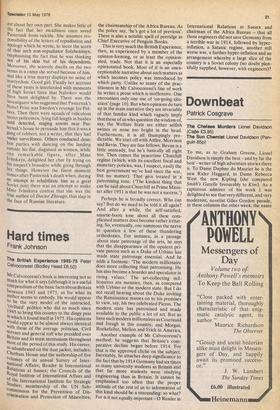Hard times
Frank Johnson
The British Experience 1945-75 Peter Calvocoressi (Bodley Head £6.50)
Mr Calvocoressi's book is interesting not so much for what it says (although it is a useful C, compendium of the basic facts about Britain between 1945 and 1975, as for what its author seems to embody. He would appear t‘o. be the very model of the instructed, civilised' politico who did so much since 1,945 to bring this country to the dingy pass In which it found itself in 1975. His opinions would appear to be almost always identical With those of the average politician, Civil servant and general toff who presided over Britain and its main institutions throughout Most of the period of this study. His career, as adumbrated on the dust jacket, includes: Chatham House and the authorship of five volumes of its annual Survey of International Affairs; Reader in International Relations at Sussex; the Councils of the Royal Institute of International Affairs and of the International Institute for Strategic Studies; membership of the UN Subcommission for the Prevention of Discrimination and Protection of Minorities;
the chairmanship of the Africa Bureau. As the police say, 'he's got a lot of previous'. There is also a notable spell of porridge as Chief Executive of Penguin Books.
This is very much the British Experience, then, as experienced by a member of the opinion-forming, or at least the opinionated, trade. Not that it is an especially opinionated book. Most of it is an unexceptionable narrative about such matters as which incomes policy was introduced by which party. Unlike so many of the practitioners in Mr Calvocoressi's line of work he writes a prose which is inoffensive. One encounters only one use of 'on-going situation' (page 10). But when opinions do turn up in the main narrative they are invariably of that familar kind which vaguely imply that those of us who question the wisdom of, say, the Welfare State are either selfish swines or none too bright in the head. Furthermore, it is all thumpingly predictable. We start off with Attlee, Morrison and Bevin. They are fine fellows. Bevan is a little unsteady, but he's basically all right too. Then comes the peacetime Churchill regime (which, with its excellent fiscal and monetary policies, was, I suspect, easily the best government we've had since the war, but no matter). That geis treated in a patronising tone. (`The kindest thing that can be said about Churchill as Prime Minister after 1951 is that he was not a success.') Perhaps he is broadly correct. Who can say? But do we need to be told it all again? And after a while, the self-satisfied, smartie-boots tone about all these complicated matters does become rather irritating. So, eventually, one summons the nerve to question a few of these thundering orthodoxies. For instance, in a passage about state patronage of the arts, he says that the disappearance of the opulent private patron such as a Duke of Urbino has made state patronage essential. And he adds a footnote: 'The modern millionaire does more collecting than patronising. He has also become a hoarder and speculator in rising values.' The art-collecting millionaires are meanies, then, as compared with Urbino or the modern state. But I do not recall hearing about the Duke inviting the Renaissance masses on to his premises to view, say, hi two celebrated Pieros. The modern state has patronised and made available to the public a lot of art. But so have such modern millionaires as Courtauld and Iveagh in this country; and Morgan, Rockefeller, Mellon and Frick in America.
Another example of Mr Calvocoressi's method: he suggests that Britain's comparative decline began before 1914. For that is the approved cliché on the subject. Inevitably, he attaches deep significance to the fact that by 1914 Germany had six times as many university students as Britain and that far more students were studying engineering than in Britain. It cannot be emphasised too often that the proper attitude of the rest of us to information of this kind should be a resounding: so what? For is it not equally important —0 Reader in International Relations at Sussex and chairman of the Africa Bureau — that all those engineers did not save Germany from a terrible war in 1914, followed by hyperinflation, a Satanic regime, another still worse war, a further hyper-inflation and an arrangement whereby a large slice of the country is a Soviet colony (no doubt plentifully supplied, however, with engineers)?


































 Previous page
Previous page